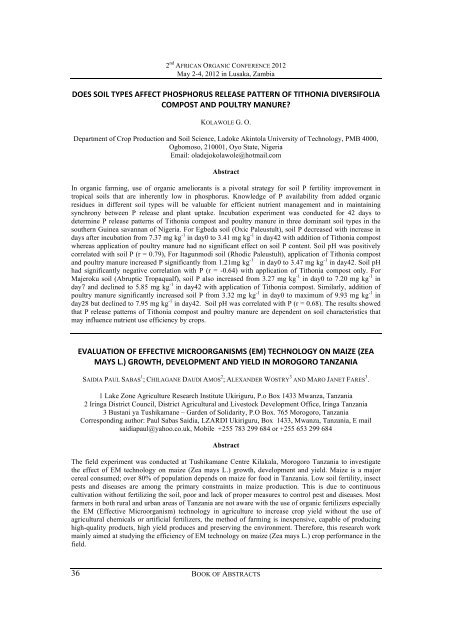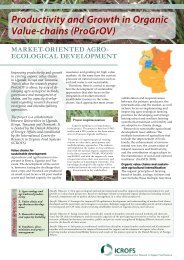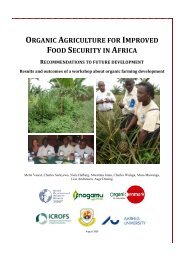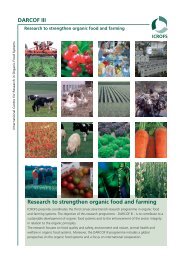The 2nd African Organic Conference â Mainstreaming ... - ICROFS
The 2nd African Organic Conference â Mainstreaming ... - ICROFS
The 2nd African Organic Conference â Mainstreaming ... - ICROFS
You also want an ePaper? Increase the reach of your titles
YUMPU automatically turns print PDFs into web optimized ePapers that Google loves.
2 nd AFRICAN ORGANIC CONFERENCE 2012<br />
May 2-4, 2012 in Lusaka, Zambia<br />
DOES&SOIL&TYPES&AFFECT&PHOSPHORUS&RELEASE&PATTERN&OF&TITHONIA&DIVERSIFOLIA&<br />
COMPOST&AND&POULTRY&MANURE?&<br />
KOLAWOLE G. O.<br />
Department of Crop Production and Soil Science, Ladoke Akintola University of Technology, PMB 4000,<br />
Ogbomoso, 210001, Oyo State, Nigeria<br />
Email: oladejokolawole@hotmail.com<br />
Abstract<br />
In organic farming, use of organic ameliorants is a pivotal strategy for soil P fertility improvement in<br />
tropical soils that are inherently low in phosphorus. Knowledge of P availability from added organic<br />
residues in different soil types will be valuable for efficient nutrient management and in maintaining<br />
synchrony between P release and plant uptake. Incubation experiment was conducted for 42 days to<br />
determine P release patterns of Tithonia compost and poultry manure in three dominant soil types in the<br />
southern Guinea savannan of Nigeria. For Egbeda soil (Oxic Paleustult), soil P decreased with increase in<br />
days after incubation from 7.37 mg kg -1 in day0 to 3.41 mg kg -1 in day42 with addition of Tithonia compost<br />
whereas application of poultry manure had no significant effect on soil P content. Soil pH was positively<br />
correlated with soil P (r = 0.79), For Itagunmodi soil (Rhodic Paleustult), application of Tithonia compost<br />
and poultry manure increased P significantly from 1.21mg kg -1 in day0 to 3.47 mg kg -1 in day42. Soil pH<br />
had significantly negative correlation with P (r = -0.64) with application of Tithonia compost only. For<br />
Majeroku soil (Abruptic Tropaqualf), soil P also increased from 3.27 mg kg -1 in day0 to 7.20 mg kg -1 in<br />
day7 and declined to 5.85 mg kg -1 in day42 with application of Tithonia compost. Similarly, addition of<br />
poultry manure significantly increased soil P from 3.32 mg kg -1 in day0 to maximum of 9.93 mg kg -1 in<br />
day28 but declined to 7.95 mg kg -1 in day42. Soil pH was correlated with P (r = 0.68). <strong>The</strong> results showed<br />
that P release patterns of Tithonia compost and poultry manure are dependent on soil characteristics that<br />
may influence nutrient use efficiency by crops.<br />
EVALUATION&OF&EFFECTIVE&MICROORGANISMS&(EM)&TECHNOLOGY&ON&MAIZE&(ZEA&&<br />
MAYS&L.)&GROWTH,&DEVELOPMENT&AND&YIELD&IN&MOROGORO&TANZANIA&<br />
SAIDIA PAUL SABAS 1 ; CHILAGANE DAUDI AMOS 2 ; ALEXANDER WOSTRY 3 AND MARO JANET FARES 3 .<br />
1 Lake Zone Agriculture Research Institute Ukiriguru, P.o Box 1433 Mwanza, Tanzania<br />
2 Iringa District Council, District Agricultural and Livestock Development Office, Iringa Tanzania<br />
3 Bustani ya Tushikamane – Garden of Solidarity, P.O Box. 765 Morogoro, Tanzania<br />
Corresponding author: Paul Sabas Saidia, LZARDI Ukiriguru, Box 1433, Mwanza, Tanzania, E mail<br />
saidiapaul@yahoo.co.uk, Mobile +255 783 299 684 or +255 653 299 684<br />
Abstract<br />
<strong>The</strong> field experiment was conducted at Tushikamane Centre Kilakala, Morogoro Tanzania to investigate<br />
the effect of EM technology on maize (Zea mays L.) growth, development and yield. Maize is a major<br />
cereal consumed; over 80% of population depends on maize for food in Tanzania. Low soil fertility, insect<br />
pests and diseases are among the primary constraints in maize production. This is due to continuous<br />
cultivation without fertilizing the soil, poor and lack of proper measures to control pest and diseases. Most<br />
farmers in both rural and urban areas of Tanzania are not aware with the use of organic fertilizers especially<br />
the EM (Effective Microorganism) technology in agriculture to increase crop yield without the use of<br />
agricultural chemicals or artificial fertilizers, the method of farming is inexpensive, capable of producing<br />
high-quality products, high yield produces and preserving the environment. <strong>The</strong>refore, this research work<br />
mainly aimed at studying the efficiency of EM technology on maize (Zea mays L.) crop performance in the<br />
field.<br />
36<br />
BOOK OF ABSTRACTS





